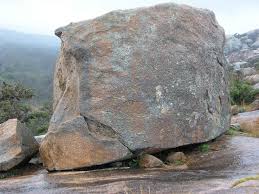记忆方法
将“boulder”拆分为“bo”和“oulder”。想象一块巨大的石头(oulder)在不停跳动(bo),这种动态的图像可以帮助你记住单词“boulder”的意思是“巨石”。
以上内容由AI生成, 仅供参考和借鉴
中文词源
boulder 大石头
词源同ball, 膨胀的,球。插入字母d.
英语词源
- boulder
-
boulder: [13] Boulder is an abbreviated form of the original compound noun boulder-stone, which was a partial translation of a Scandinavian word which survives in Swedish dialect bullersten ‘large stone in a stream’. Sten is ‘stone’, of course, and buller is usually identified with Swedish buller ‘rumbling noise’, on the basis presumably of the sound of a stream gurgling over rocks. Boulder first appears on its own, outside the compound boulder-stone, in the 17th century.
- boulder (n.)
- 1670s, variant of Middle English bulder (c. 1300), from a Scandinavian source akin to Swedish dialectal bullersten "noisy stone" (large stone in a stream, causing water to roar around it), from bullra "to roar" + sten "stone." Or the first element might be from *buller- "round object," from Proto-Germanic *bul-, from PIE *bhel- (2) "to inflate, swell" (see bole).
权威例句
- 1. I saw her push the boulder down on you.
- 我看见她将巨石推下砸向你。
- 2. The boulder sheltered them from the chilling wind.
- 那块大石头替他们挡住了寒风。
- 3. A flowing stream inarms a boulder in its passing.
- 流水围绕大石流过去.
- 4. We all heaved together and removed the boulder.
- 大家一齐用劲,把大石头搬开了.
- 5. He took my hand to help me over a boulder that blocked the way.
- 他牵着我的手带我爬过那块挡道的卵石.
